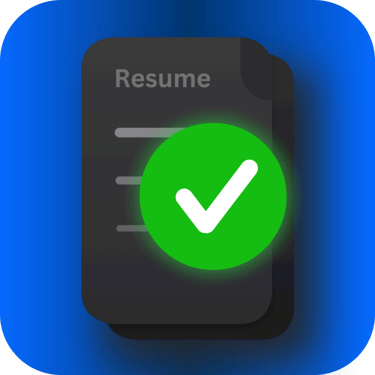75% of Resumes get rejected by ATS before anyone sees them
6/25/20253 min read
80% of hiring managers are more likely to review a resume if it includes keywords from the job description
You know that sinking feeling when you apply to what feels like a hundred jobs and hear nothing back? Well, here's the frustrating truth: most of the time, it's not even about you. Your resume probably got tossed by a computer before any actual person had the chance to see how awesome you are.
The Robot gatekeeper problem
Here's what's really happening behind the scenes. Companies get flooded with applications—we're talking hundreds, sometimes thousands for a single job posting. So they've basically hired digital bouncers called Applicant Tracking Systems (ATS) to do the dirty work of weeding people out.
These systems scan your resume like they're looking for a secret password. If you don't have the right combination of words and phrases, you're out. Game over. Thanks for playing.
It doesn't matter if you're the perfect fit for the job or if you have ten years of amazing experience. If the robot doesn't like what it sees, you're getting the digital equivalent of a "don't call us, we'll call you."
Why keywords are your new best friend
This is where things get interesting. When resumes do make it through the ATS maze and land on an actual human's desk, something pretty predictable happens. Hiring managers are way more likely to give serious attention to resumes that sound like they actually read the job posting.
Think about it from their perspective. If you posted a job looking for someone with "project management experience" and "budget oversight skills," wouldn't you be more interested in the person who uses those exact phrases versus someone who talks about "leading stuff" and "handling money things"?
It's like speaking the same language. When your resume echoes back the words they used in their job posting, it feels like you get what they're looking for.
But don't just word-vomit keywords everywhere
Now, before you go copy-pasting the entire job description into your resume, pump the brakes. These ATS systems aren't stupid—they can tell when you're just throwing buzzwords around like confetti at a New Year's party.
The trick is to weave in the important terms naturally. If they're looking for "customer relationship management," don't just randomly stick that phrase in there. Actually talk about how you managed customer relationships and use their language to do it.
Understanding what ATS wants
Start by becoming a job posting detective. When you see a position you want, read that description like it's going to be on the test (because it basically is). Circle the skills they mention over and over. Notice how they describe the role and what kind of person they're dreaming about.
Then take a hard look at your resume. Are you speaking their language, or are you using completely different words to describe the same stuff? If they say "data analysis" and you say "crunching numbers," that's a problem the ATS might not figure out.
Also, keep your resume format simple. I know that creative template you found on Pinterest looks cool, but ATS systems hate fancy graphics and weird layouts. Stick with clean, straightforward formatting that a robot can actually read.
Remember, you still make the final call
Here's the thing though—once you get past the digital bouncer, you're dealing with real people again. And people want to connect with other people, not keyword-stuffed robots.
Your resume needs to do double duty. It has to be smart enough to fool the ATS system, but interesting enough to make a human want to pick up the phone and call you. That's a tricky balance, but it's totally doable.
Rolling with the changes
Look, this whole ATS thing isn't going anywhere. If anything, these systems are getting smarter and more companies are using them. You can either complain about it (which won't help you get a job) or learn to work with it.
The good news? Once you figure out this game, you'll have a huge advantage over everyone else who's still wondering why they never hear back from applications.
You don't have to become a different person or fake who you are. You just need to learn how to translate your awesome qualifications into language that both computers and humans can understand and get excited about.
The bottom line
Job hunting has changed, and pretending it hasn't won't get you hired. The companies using these systems aren't trying to make your life harder—they're just trying to manage the chaos of modern hiring.
Once you understand the rules of this new game, you can play it well. Your resume can satisfy the robots AND impress the humans. And when that happens? That's when your phone starts ringing with interview requests instead of sitting silent while you wonder what went wrong.
The job market might feel stacked against you sometimes, but knowing how ATS systems work gives you the inside scoop. Use it wisely, and watch your response rate go from crickets to callbacks.


